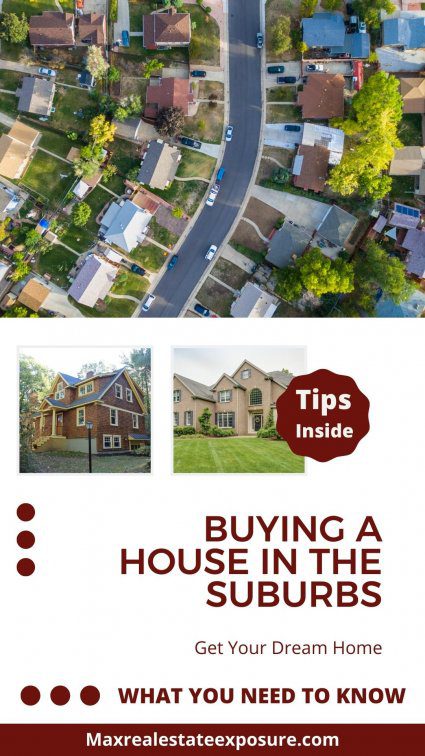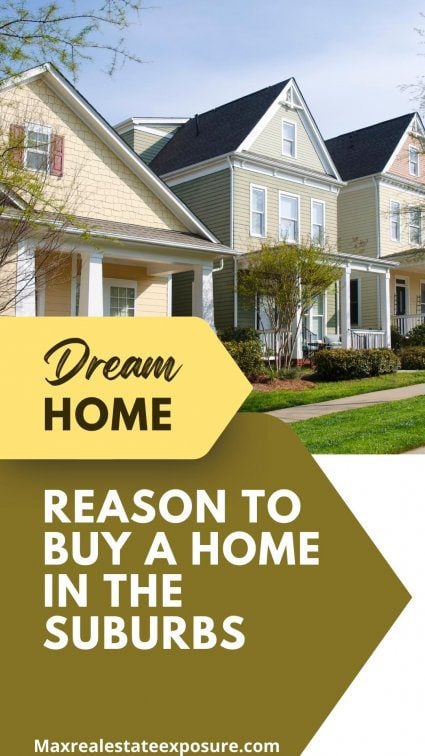Tips For Buying a Home in The Suburbs
 One of the questions many buyers will ask themselves is should I buy a house in the suburbs or remain in the city.
One of the questions many buyers will ask themselves is should I buy a house in the suburbs or remain in the city.
A Real Estate agent will also be questioned about the housing market and home prices in the suburbs vs. the city.
It is not uncommon that suburban homes may have a different property value than a similar home in the city or even within the city limits. Typically, the suburban market will differ somewhat from what is happening in the city.
Buying a house in the suburbs will have pros and cons compared to city living.
Purchasing a home in a large metropolitan area is usually more expensive and will grow in value faster than in suburban areas. At least that was the case before COVID-19 came on the scene. Could that be changing?
Is there more demand for buying houses in the suburbs than in years past? Over the last few years, that’s seemed to be the case. When Covid hit, more and more employers allowed their employees to work from home.
There became a reduced need to be in or around the city. A mass exodus ensued. Many homeowners started to rethink their real estate needs.
Living in the suburbs has become much more appealing, especially in areas where you can get an acre or more land. Social distancing is undoubtedly easier to do.
Living in the suburbs may not be for everyone. If you are used to living in the city and like that lifestyle, you could quickly be bored in the country.
Like many things in life, there are advantages and disadvantages.
Let’s look at some of the essential considerations of buying a home in the suburbs.
Definition of Suburbs vs. City Living
When people think about living in the suburbs vs. the city, they usually have a clear vision. For most, a suburb calls to mind sizeable single-family homes with a large yard, a white picket fence, and birds happily chirping.
On the other hand, a city can be considered traffic congestion, tall buildings, and many people.
While many distinguish between the suburbs and the city by the look and feel, other factors play into it. Geography often plays a significant role in what qualifies as a suburban area.
For the most part, many people will think of a suburb as a residential community located on the outskirts of a city. Cities, on the other hand, are regarded as a hub for business and commerce.
Most cities are considered heavily populated, while suburbs will be far less dense. More often than not, living in a suburb includes more outdoor space and a larger home.
What Is The Real Estate Market Like In The Suburbs?
One of the most vital things to emphasize is that all real estate is local. What shapes one market might be very different from another. Massachusetts’s suburban real estate market might be much different than in California, Michigan, or Florida.
However, as a general rule, suburban living has increased in popularity. Over the last few years, suburban markets have been shaped by meager inventory.
Many people have decided to move out of the city and head to less urban areas. The desire to spread out and have more land has become evident.
What started as low inventory areas in many suburbs has turned into ultra-low inventory. When supply and demand are out of balance for housing, it causes prices to rise rapidly.
In many areas of the country, there is very low inventory. These conditions have caused one of real estate’s most outstanding seller’s markets.
With buyers flocking to the suburbs, most homes have experienced bidding wars. It has been real estate nirvana for those already owning property in the burbs.
Being in the driver’s seat has allowed home sellers to get incredible home prices and fabulous terms. Home buyers have been doing crazy things, like waiving home inspections and mortgage contingencies.
With intense competition, buyers have been doing whatever it takes to get their dream home. Going outside the box has been the norm, not the exception.
Reasons For Buying a House in The Suburbs
 There are many reasons why home buyers may find purchasing a home in the suburbs attractive. Some of the most common include the following:
There are many reasons why home buyers may find purchasing a home in the suburbs attractive. Some of the most common include the following:
- You get better school systems
- A house comes with more land and privacy
- There are more prominent neighborhoods and subdivisions more conducive for kids
- Finding specific amenities that come with homes, like a pool, may be easier to find
- There will be less noise and a lower crime rate
Great Schools Can Be Found in The Suburbs
Local school systems are one of the primary driving forces for many home buyers who purchase in the suburbs. Good schools matter to a significant percentage of the population.
You can often find a much better school district outside the city.
Some communities may have the best school systems in their respective state. It is certainly true here in my area of Massachusetts.
There are numerous school systems in the Metrowest area that are highly ranked. There are usually fewer students in the public schools and fantastic private schooling options too.
An excellent school system will almost always drive higher real estate appreciation rates. It drives up housing demand, which raises housing prices in that area.
Many buyers will place their kid’s education as a top priority. You can’t always get the best school system when you live in the inner city. A suburban school is often one of the most important things for a potential buyer.
Academic performance and getting into a top-notch college are often significant factors in the buying process. While property taxes may increase, towns with good schools retain their home values.
The Suburbs Offers More Land and Privacy
One of the significant benefits of moving to the country is you’ll get more land and the privacy that comes with it. When you are used to living on a postage stamp-sized lot in the city, moving to the suburbs can be pretty liberating.
The zoning will differ from town to town, but it is not uncommon to find lots that are an acre or more. Finding lots with acreage in the city would be like finding a needle in a haystack. It is unlikely to happen.
In the suburbs, you can spread out and add amenities you never thought possible. Want an additional garage because your hobby is collecting or working on cars? You might find that already with an existing home. Other properties will have enough land that you’ll be able to add an addition.
Suburban life is very different in this respect.
Appealing Neighborhoods and Subdivisions Are More Common in the Suburbs
Is the thought of living in a gated community enticing? Do you think about living in a subdivision with sidewalks and Cul-De-Sacs for your kids to play in? Does the sound of group activities with your neighbors sound appealing?
Finding neighborhoods like this is much more commonplace when you buy in the suburbs. Some will have an HOA, and others will not. One thing is for sure – you’ll have choices.
More Sense of Community in The Suburbs
There will be a strong feeling of pride for your town.
It will be a much different lifestyle than living in the city. Buying in a suburb allows neighbors to get to know each other more easily. Building a sense of community and roots is the norm.
Many suburban communities will hold events such as a 4th of July parade, neighborhood barbecues, or events at the town common. Activities such as little league and youth soccer are also prevalent.
Better Chance of Finding a New Home
If you want to purchase new construction, the suburbs will be the best place to find it. There are many suburban neighborhoods with ongoing new construction projects. Many single-family homes and condos are being built.
They are often found in a popular area perfect for growing families. Many of these new construction projects will fit the bill when you want a new place with more extensive square footage.
Finding new construction homes around a city center is usually very challenging. Finding a bigger house that’s new is rare.
When you want to custom build your own home, finding something in the suburbs will be far easier. City dwellers don't have this luxury.Click To TweetSome Amenities With Homes Will Be Easier to Come By
When you live in the suburbs, some amenities will naturally be easier to find than in the city. For example, an in-ground swimming pool.
With additional land available, it is not uncommon to see more swimming pools in neighborhoods. You might also have a basketball court right in your yard.
Less Noise and Crime in The Country
Most cities generally have more crime, noise, and congestion than their counterparts out in the burbs. Many people will leave the city because they want to get away from it all.
Many suburban areas will have much lower crime rates and less noise. There will be completely different living conditions vs. the city. On most occasions, you’ll unlikely find crowded streets with suburban living.
Drawbacks of The Suburbs Compared to The City
 Living in the suburbs isn’t a complete utopia. You may not be able to get used to some drawbacks. When living in the city, many things you’re used to visiting are within walking distance. That may not be the case in the suburbs.
Living in the suburbs isn’t a complete utopia. You may not be able to get used to some drawbacks. When living in the city, many things you’re used to visiting are within walking distance. That may not be the case in the suburbs.
Getting used to getting in your car to go everywhere can be challenging. If you do not like driving to work, you may want to research public transportation before committing to a particular town.
You’re unlikely to have the same cultural experience when living in the suburbs.
Let’s face it many cities have some of the best venues for entertainment, whether a Broadway show, comedy club, or play. That will be harder to find in a suburban medium. With city life, you’re less likely to be bored.
You will also likely find the city’s transportation system much more accessible. Metro areas will be harder to find the train, a bus, or even an Uber anywhere quickly.
If you are a sports fan, things won’t be as easy as calling a cab or Uber to watch your favorite team.
When moving to the suburbs, you will also quickly realize that your maintenance costs will increase. You will likely have a larger house and yard, which means more to care for.
Summary of Pros and Cons of Suburbs vs. City
These are the primary advantages and disadvantages of buying in the suburbs vs. the city. Weighing these important factors could be helpful in your decision process.
Pros of The Suburbs
- Better schools
- More land
- Increased chance of buying new construction
- Close-knit communities
- More privacy
- Cheaper goods and services
Cons of The Suburbs
- You need to drive much more
- Fewer great restaurants and activities
- Can’t walk to as many places
- More maintenance costs
Pros of The City
- Tons of restaurants and bars
- More entertainment options
- More cultural activities
- Can walk to many places
- Easy access to public transportation
Cons of The City
- More noise and congestion
- Denser population
- Higher cost of living
- More crime
- Educational systems are usually not as good
Work With An Exceptional Buyer’s Agent
One of the first things you should do when deciding that a suburban lifestyle fits your needs is to hook up with a local buyer’s agent. Many people make the mistake of going directly to the listing agent.
Potential buyers need to understand two types of agents – listing agents vs. selling agents.
Going to the seller’s agent is a mistake that can cost you money. A buyer’s agent becomes your fiduciary. They work on your behalf to get the best deal. A listing agent works for the seller’s best interest, NOT yours.
A good buyer’s agent will help with proper due diligence and research the history of the house you’re interested in purchasing. They will try to find a good deal you and your family will love.
When you’re ready to make an offer, they will provide a comparative market analysis to ensure you don’t overpay.
Financing Tips For Suburban Home Buyers
Getting your home loan will be one of the more critical tasks. Whether you’re buying a house in the suburbs or the city, getting preapproved for a mortgage before looking at homes is prudent.
Ensure your credit scores are accurate to get the best rates and terms.
The mortgage rates you receive from lenders will be better when you are a credit-worthy borrower.
Final Thoughts on Buying in The Suburbs
Buying a property in the suburbs isn’t going to be for everyone. Some buyers may think it is what they want and move back to the city. Others may wish they had decided to purchase sooner.
Hopefully, you now have a better idea of what to think about if you consider moving to the suburbs.
About the Author: The above Real Estate information about buying a house in the suburbs was provided by Bill Gassett, a Nationally recognized leader in his field. Bill has expertise in mortgages, financing, moving, home improvement, and general real estate.
Learn more about Bill Gassett and the publications he has been featured in. Bill can be reached via email at billgassett@remaxexec.com or by phone at 508-625-0191. Bill has helped people move in and out of Metrowest towns for the last 37+ years.
Are you thinking of selling your home? I am passionate about real estate and love sharing my marketing expertise!
I service Real Estate Sales in the following Metrowest MA towns: Ashland, Bellingham, Douglas, Framingham, Franklin, Grafton, Holliston, Hopkinton, Hopedale, Medway, Mendon, Milford, Millbury, Millville, Natick, Northborough, Northbridge, Shrewsbury, Southborough, Sutton, Wayland, Westborough, Whitinsville, Worcester, Upton, and Uxbridge MA.


Excellent synopsis. Really enjoyed the comparison and contrast of the suburbs vs city.
Thanks Eric. There is quite a bit to think about when determining to buy in the city vs. the suburbs.